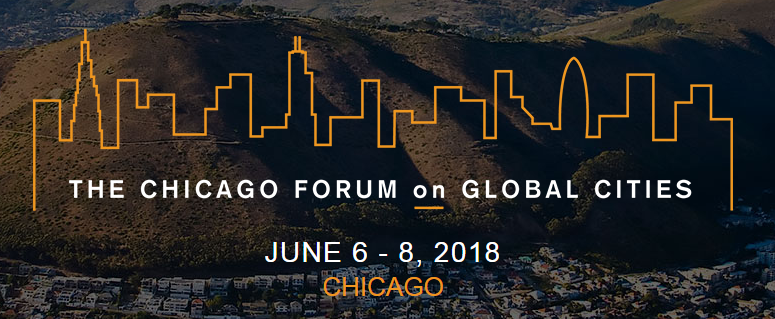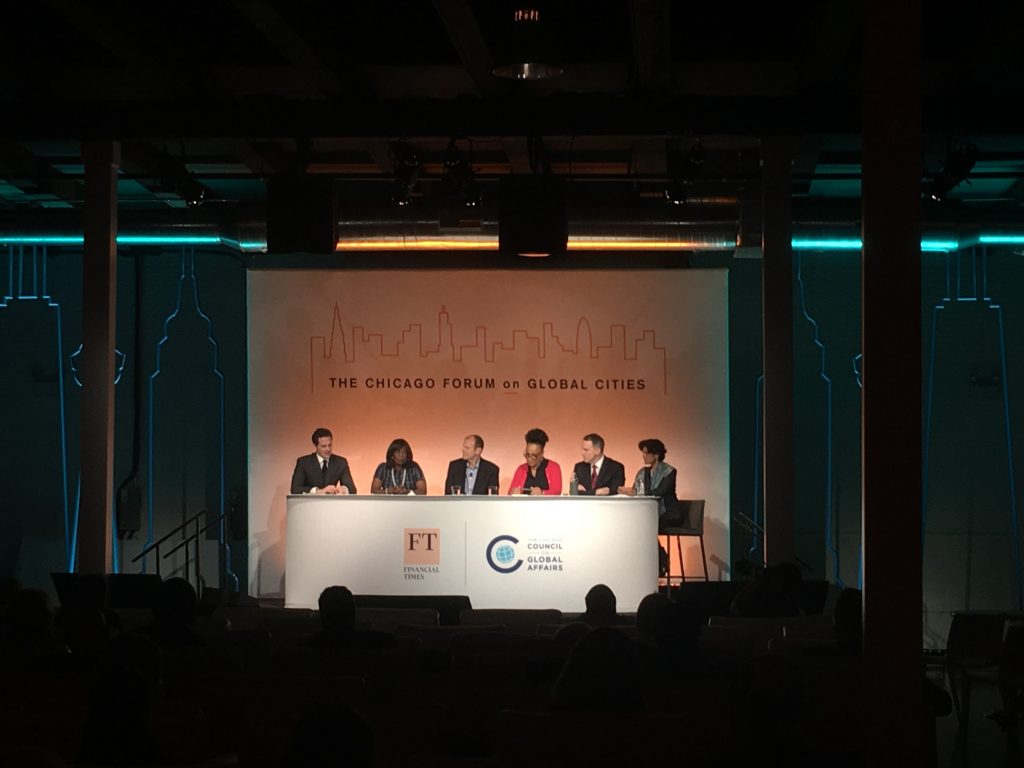Last week, the IESE Cities in Motion team had the opportunity to attend the 2018 Chicago Forum on Global Cities, a three-day international conference organized by the Chicago Council on Global Affairs and the Financial Times. The event, with more than 80 speakers and delegates from over 35 countries, brought together global leaders and decision makers – including current and former mayors, CEOs, artists, academics and policy experts – to discuss the influential role that cities are playing in solving global challenges and to encourage the sharing of best practices to resolve such pressing issues.
For the second consecutive year, IESE Cities in Motion was one of the international knowledge partners of the forum. As partners, I participated in a very interesting workshop on “Economic Development for Inclusive Growth”, which explored a series of strategies to build growth directly in neighborhoods with experiences from the Global North and the Global South, and a special focus on the city of Chicago.

A wide spectrum of topics were discussed by world leaders during the international conference, including: how to ensure inclusive growth in cities; cities as economic powerhouses; the role of metropolitan governance; the future of work; climate change, carbon neutral cities and the importance of sustainable buildings; cities of the Global South; or diplomacy in the urban age.
Since it is not possible to describe all the insights and contributions from the speakers and panelists, I am going to highlight five key takeaways from the event. In case you want to watch all the full videos of the plenary sessions and flash talks, live stream videos are available online.
1. The world is urbanizing at a dizzying pace. During one panel it was mentioned that “86 people move into the city of Lagos every hour”, resulting in some 750 thousand people a year. This accelerated urbanization growth, especially in cities in developing countries, is creating huge challenges for city managers in terms of infrastructure and services provision.
2. Inequality: affordable housing and the importance of education. The large divide between the rich and the poor in cities was highlighted as critical issue in multiple occasions during the forum. Several speakers recognized the high cost of living and lack of affordable housing as grave problems in most of today’s cities. Developing neighborhoods with mixed types of housing could be a good strategy to reduce physical and social exclusion in many urban areas around the world. Additionally, the importance of education in reducing inequalities and the need to design cities to support healthy early childhood development was also stressed during the forum.
3. Climate change and sustainable buildings. During the forum it was mentioned that by 2050, we will double the total number of buildings existing today. This is like rebuilding our planet. Supporting green buildings for mitigation and adaptation to climate change will be of critical importance to achieve sustainable futures.
4. The importance of metropolitan governance. Defining the limits of a city is increasingly difficult. Since neighbouring municipalities often merge into larger metropolitan areas, collaborating with nearby authorities, whether it is in a new formal layer of government or in an informal association, is more critical than ever before. Adopting a collaborative approach to metropolitan governance creates economies of scale that helps achieving better efficiencies in important outcome variables in cities, such as public transport systems, environmental issues, and urban sprawl.
5. Cities shaping the global agenda. The increasing role of cities and metropolitan regions to shape the international agenda and/or to collaborate together in order to lobby national governments on issues such as commerce and trade, education, culture or migration was highlighted by different speakers during the conference.

The challenges lying ahead of cities are huge, from growing populations, to pollution and congestion, transportation, economic development, energy efficiency, social cohesion or the demand for better quality of life. However, by applying more targeted strategies, a long term vision and better local government policies that support sustainable and inclusive economic growth, cities can also be part of the solution. In order to solve global challenges, is it time to look local?



Thanks for sharing the useful article